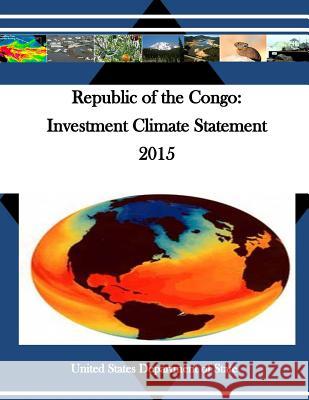Republic of the Congo: Investment Climate Statement 2015 » książka
Republic of the Congo: Investment Climate Statement 2015
ISBN-13: 9781530701421 / Angielski / Miękka / 2016 / 24 str.
Republic of the Congo: Investment Climate Statement 2015
ISBN-13: 9781530701421 / Angielski / Miękka / 2016 / 24 str.
(netto: 56,57 VAT: 5%)
Najniższa cena z 30 dni: 55,53 zł
ok. 13-18 dni roboczych
Dostawa przed świętami

Darmowa dostawa!
The Republic of the Congo (RoC) is a country of enormous potential wealth relative to its small population of 4.5 million. The RoC's economy continues to demonstrate sustained moderate growth, hovering near 5 percent in 2015 according to the RoC's Ministry of Economy and Finance. This growth is mostly attributable to oil production as oil accounts for 70 percent of GDP and 80 percent of government revenue. The non-oil sector is primarily focused on the logging industry, but growth is also occurring in the telecommunications, banking, mining (potash, iron ore), construction, and agricultural (palm oil, rubber) sectors. The RoC is a country poised for economic diversification, with some of the largest iron ore and potash deposits in the world, a heavily-forested land mass, a deep-water International Ship and Port Facility Security (ISPS) Code-certified port, fertile land, and a small but heavily urbanized population. Since 2000, the RoC has been eligible for the African Growth and Opportunity Act (AGOA), a nonreciprocal trade preference program that provides an additional enticement for export-related investment. RoC is a member of Financial Community of Africa (FCA). Despite continuing yearly improvements in the macroeconomic figures for the RoC, 46 percent percent of the population lives on less than USD 1.40 per day, putting poverty prevalence much higher than in peer oil-exporting countries. There is no apparent middle class with respect to education, skills, and material living standards. The RoC suffers from low education standards and little social mobility. Most of the population still operates in the informal sector of the economy. Weak infrastructure, including poor transportation systems, a nascent broadband internet, and inconsistent electric and water supply, present the biggest hurdles for most foreign direct investment. The country is still without a fully paved road to connect its distinct commercial and political capitals of Pointe Noire and Brazzaville, respectively, or a reliable railroad system to connect inland iron ore and timber resources in the north and west of the country to the port of Pointe Noire. However, infrastructure improvement projects are evident everywhere in the major cities of the RoC, and the government reports spending enormous amounts of capital on infrastructure improvements. Investors report that the commercial environment in Congo has not improved substantially in the last few years. Many feel that they have good working relations with government officials, but corruption, especially among informal tax collectors, is still widespread. In January 2013, the Congolese government created an Agency for the Promotion of Investments (API) to promote economic diversification through expanding the pool of external investors. Throughout 2013, the government continued to put in place regulatory reforms with the stated goal of improving the business environment. Nevertheless, businesses are not yet noticing positive impacts from the new regulations, and the RoC remains near the bottom (178 out of 189) on the World Bank's, Ease of Doing Business rankings. Established American businesses operating in the RoC, as well as companies interested in establishing a presence, continue to encounter obstacles. Various companies have raised concerns to the U.S. Embassy related to land titles, tax law misapplication, and general difficulty initiating negotiations with government of the RoC (GRoC) officials. In May 2014 the RoC promulgated several decrees to promote business and reduce policy constraints. These include eliminating customs-like controls of goods within the territory of the RoC, land purchases, a time limit of 48 hours in which to establish a business, simplified means of paying of taxes, and streamlining the procedures for obtaining building permits.











